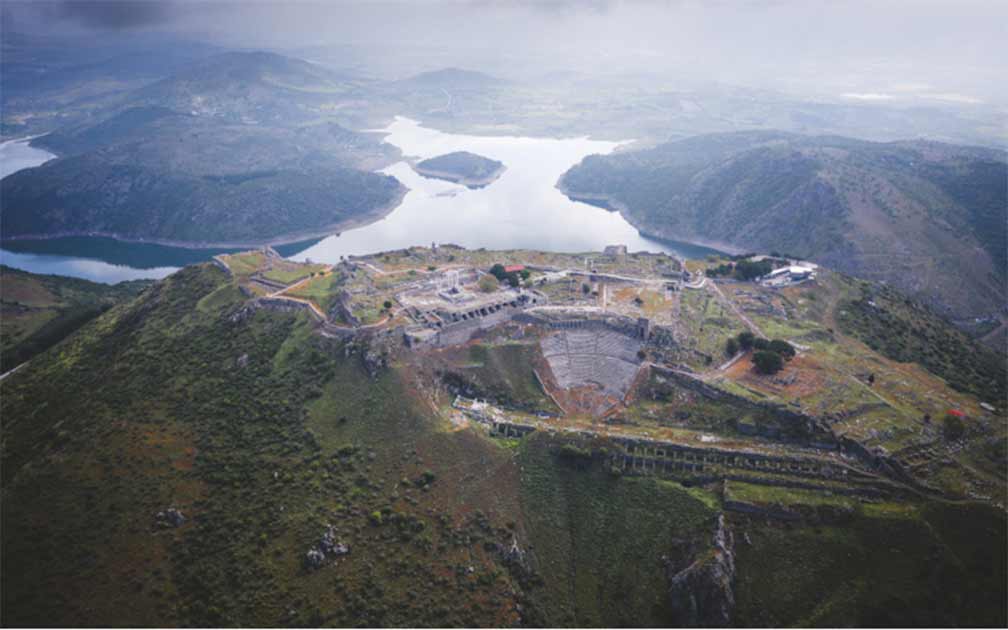Excavations Reveal Pergamon Amphitheater Had Reserved ‘Box Seats’
Which sports and entertainment fan today hasn’t yearned for box seats or VIP seating for their favorite concert? Despite the needle of time ticking away through these centuries, some things don’t seem to have changed, as archaeologists from the German Archaeological Institute and Berlin Technical University’s Institute of Architecture seem to have found out. At the Pergamon amphitheater, renowned for its similarities with the iconic Colosseum at Rome, private seating areas, with names engraved on them have been discovered, reports Daily Sabah.
The Pergamon Amphitheater
During excavations at the ancient city of Pergamon, which have been ongoing since 2018, this team of archaeologists, under the aegis of Turkey’s Culture and Tourism Ministry, have been hard at work at the 1,800-year-old amphitheater. It would host gladiator and animal fights in the 2nd century, along with being a site for public executions and re-enactments of naval battles. It was strategically built so large to give it an edge over other ancient cities, such as Ephesus and Smyrna. The seating capacity was at least 25,000, but perhaps could seat 50,000 people, preliminary investigation reveals.
- New Digital Map Gives Fresh Details About The Ancient City Of Pergamon
- 1,500-year-old Greek Graffiti Sheds Light on Ancient Civilization

Archaeologists recording details of private seating areas at Pergamon amphitheater. (Anadolu Agency)
“They wanted to build a replica of the Colosseum here, which was frequented by all segments of society. But people from the upper class or important families had private seats in special sections with their names engraved on them. Another detail that caught our attention was that Latin names were written in Greek letters. We believe that some people from Italy had a special place in the Pergamon amphitheater,” director of the German Archaeological Institute, Felix Pirson, tells Anadolu Agency.

Inscribed seat blocks from the ‘cavea’ at Pergamon amphitheater (I. Yeneroğlu / DAI Pergamongrabung 2021)
The seating areas for the elite and upper-classes of the time, look similar to private boxes today. The engraved stone seats were purchased or rented for periodical use, reports Hurriyet Daily News. Often, very rich and very important families, mainly Italian, had special areas reserved entirely for them. At least 5 of these private boxes have been found, which İhsan Yeneroğlu, an archaeologist and historical building researcher from the Technical University of Berlin, calls ‘cavea’.
At the Pergamon amphitheater, the first Christians in the area were executed (the Roman Empire, till now, had not officially adopted Christianity as the state religion). Naval scenes, called ‘naumachia’, were re-enacted here, and criminals would be thrown in front of the hungry crowd, that fed off the bloodlust and war cries.

Inscribed seat blocks were moved to the courtyard of the Red Basilica. (I. Yeneroğlu / DAI Pergamongrabung 2021)
The TransPergMicro Project
The ‘TransPergMicro Project’, as it is called, is an ambitious tripartite micro-region concept, that seeks to combine archaeology, research, and physical geography in order to judge the impact of historical human-environment relations under the ‘Anthropocene’. What has been found is that the settlement history started as early as the 2nd century BC, but there is evidence going back to the 7th century.
Significant evidence has been found in this region from during the Hellenistic Period (3rd century BC – 1st century BC), along with the Roman Imperial Period (1st – 3rd century AD). This includes a rapid doubling of the urban area during the late 1st century AD, along with monumental construction. This has helped archaeologists discern the relationship between cities, rural settlements, and the surrounding landscape. Interesting data has emerged that assesses resource use, production and consumption, health and lifestyle choices of the settlers, and the design of living spaces, amongst others.

The amphitheater at Pergamon. (irinaorel / Adobe Stock)
The German Research Foundation, which led this proposal, has been awarded the approval of the first funding phase of this project, that is deemed to last 12 years. The project is being led by the DAI’s Istanbul Department, Freie Universitat Berlin, Technische Universitat Berlin, the Celal Bayar Universitesi Manisa, and the Christian-Albrechts-Universitat zu Kiel.
Amongst other significant discoveries under the TransPergMicro Project at the Pergamon site, the famous Goth’s Wall has been found. Additionally, the remains of a late Roman peristyle house with floor mosaics have been documented in detail. The western outskirts of the settlement show an extensive necropolis (an ancient cemetery), where a fascinating Roman tomb has been discovered.
This is in addition to a Roman thermal bath with the modern name “Kleopatra Hamamı”, which was drawn from a nearby hot spring, that was in use till the late 1980s, and the Western Lower Gymnasion, which was a firm part of the city hill in Roman times. Felix Pirson has said that all the finds of the project will be displayed at Pergamon Museum in Izmir, towards the end of the year, when the excavation project is scheduled to end.
Top image: Aerial view of the Pergamon Acropolis and huge Pergamon Amphitheater, Izmir Province, Turkey. Source: Tarik GOK / Adobe Stock
By Sahir Pandey
References
Anadolu Agency. 2021. VIP 'box seats' found at ancient amphitheater in Turkey's Izmir. Available at: https://www.dailysabah.com/life/history/vip-box-seats-found-at-ancient-amphitheater-in-turkeys-izmir.
Hurriyet, DN. 2021. Exclusive lodges found in Turkey’s ‘Colosseum’. Available at: https://www.hurriyetdailynews.com/exclusive-lodges-found-in-turkeys-colosseum-168085.
Yeni Safak. 2021. 'Box seats' for elite found at ancient amphitheater in Turkey's Izmir. Available at: https://www.yenisafak.com/en/news/box-seats-for-elite-found-at-ancient-amphitheater-in-turkeys-izmir-3580856.



















